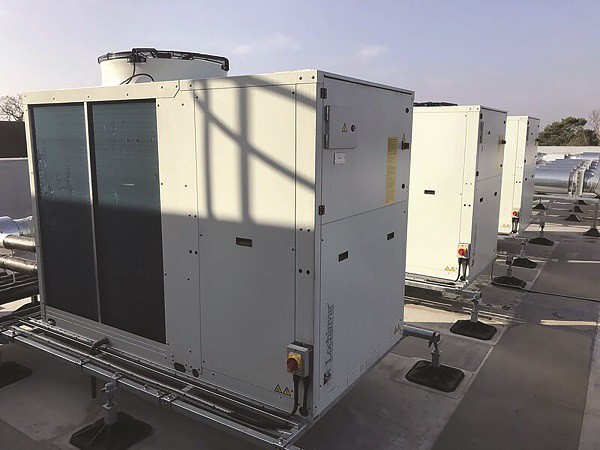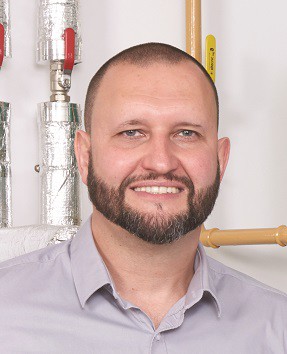Heat pumps can help to power the recovery

How can the building services industry can play its part in the UK's economic recovery?
2020 will always be remembered as the year that Covid -19 swept the globe and caught us largely unawares. Most governments were not prepared and neither were industries, businesses and boardrooms.
Now, with the UK and most of Europe facing a ‘second wave’, it looks like there are still some hard months ahead. However, we also must start the rebuilding process with entire sectors resetting and many redefining their purpose and services – hospitality, travel, tourism, entertainment, sport, to name a few. And what of building services?
Lockdown and working from home has turned conventional wisdom on its head. However, at the moment of greatest risk, there is also great opportunity, and the building services industry is uniquely placed to add value to the rebuilding of the new economy and in helping to fulfil the promises of the green agenda.
We are entering a post-Covid world where there is a real mixture of economic factors, trajectories and trends which affect the socio-political landscape, regulatory frameworks and public behaviours.
Disruptive
There are also many disruptive technological changes – often characterised as ‘the fourth industrial revolution’ – and one of the key challenges for the industry is to innovate, invest in its workforce and ensure that its products and services are sustainable against this new backdrop.
In the case of building heating and ventilation systems, that means 20, 30, 40 years and more, which is why the industry needs to take a strategic approach because decisions we make now will have long lasting effects on running costs, carbon emissions, building safety and occupant comfort.
As well as technical innovation, this calls for strong leadership, rigorous long-term planning coupled with the agility to change direction quickly, and a fresh look at business and corporate strategy in a Covid and post-Covid environment.
Green recovery
One example of the changing socio-political landscape is the UK government's plans for a 'green recovery' powered by low carbon solutions. The ambition for net carbon zero by 2050 can’t be faulted whether or not it is realistic or achievable. It is a clear aim that has the potential to hugely increase demand for low carbon solutions like heat pumps and hybrid heating and hot water systems.
However, satisfying this demand and ensuring installations continue to achieve high performance and reduced carbon emissions throughout their operating life will depend on the ability of our industry to innovate around four key areas in the value chain:
• the quality of system design and its adaptation into both new and existing commercial buildings.
• the effectiveness of installation,
• the service that underpins commissioning and maintenance,
• and investment in staff training.
This will ensure that the installations will continue to operate and achieve high performance not for just years, but for a lifecycle of decades.
We have talked about adopting a ’whole system’ approach for many years, but it has only been embraced piecemeal because it requires everyone to consider each part of the value chain – and look for long-term value rather than short-term capital cost savings.

It also depends on our ability to source and manufacture high quality components, develop a skilled and adaptable workforce, increase technical know-how and back-up, and the ability above all to explain and express the benefits of the product lifecycle to customers, clients, regulators, and the general public alike in terms of the green agenda.
New challenges
The industry is well poised to embrace these challenges and adapt to the new post-Covid landscape. In the brave new world, it will be more important than ever to focus on the quality of work assured by ever-improving industry standards, tangible proof of competence, and the industry’s ability to meet its legislative and regulatory obligations.
If the industry can demonstrate this approach it could have significant and positive consequences for the ongoing high-level debate around the potential wider role for heat pumps. An influential group of MPs is in the midst of a debate about the pros and cons of accelerating the roll out of the technology – in all its different shapes and sizes – across the country.
The Prime Minister has already stated that ground source heat pumps would play a major part in his envisioned ‘green industrial revolution’ and the Committee on Climate Change estimates that 19 million heat pumps, serving both residential and commercial/industrial buildings, will need to be installed to meet the government’s commitment to reach net-zero by 2050.
Capacity
However, the parliamentary Environmental Audit Committee (EAC) believes there are several barriers to extending the role of heat pumps in both the residential and commercial building sectors. Not least is their cost compared with conventional heating technologies like gas boilers and the need to increase the capacity of the National Grid to accommodate the additional electricity that would be needed to support such a huge expansion in numbers.
“Heat pumps are playing an increasingly significant role in decarbonising heat in other countries. I look forward to the Committee examining why this has yet to take off across the UK,” commented the committee chair Philip Dunne.
The committee is calling for submissions on how uptake of the technology could be accelerated including raising public awareness; what can be done to reduce costs and how the government can help to tackle the ‘skills gap’ for designers, builders and installers.
Other energy efficient technologies
Illustrating heat pumps ability to work as part of whole building – and even whole community – systems could be key to this debate. Heat pumps work very well in tandem with other energy efficient technologies like condensing boilers and water heaters to maximise energy and carbon savings – and are particularly effective where building owners are looking to upgrade their systems.
As well as improving the performance of individual buildings, heat pumps could play an even bigger part in reducing carbon emissions through their use in distributed heat networks for homes, public sector buildings, shops, offices, sport facilities, hospitals, and universities.
There are estimated to be around 14,000 heat networks in the UK, providing heating, hot water and/or cooling to almost half a million consumers. Since they aggregate heating and cooling supplies across a neighbourhood or entire district, these networks can unlock otherwise inaccessible large-scale renewable and recovered heat sources, such as waste heat and thermal energy from rivers – ideal for use by heat pumps.
This illustrates why many in our sector consider heat pumps to have an exciting and potentially unlimited future as an enabling technology able to unlock major system savings across a range of buildings and facilities – while also helping to drive the government’s long-term low carbon ambitions.
Liam Elmore is Sales Director of Lochinvar







